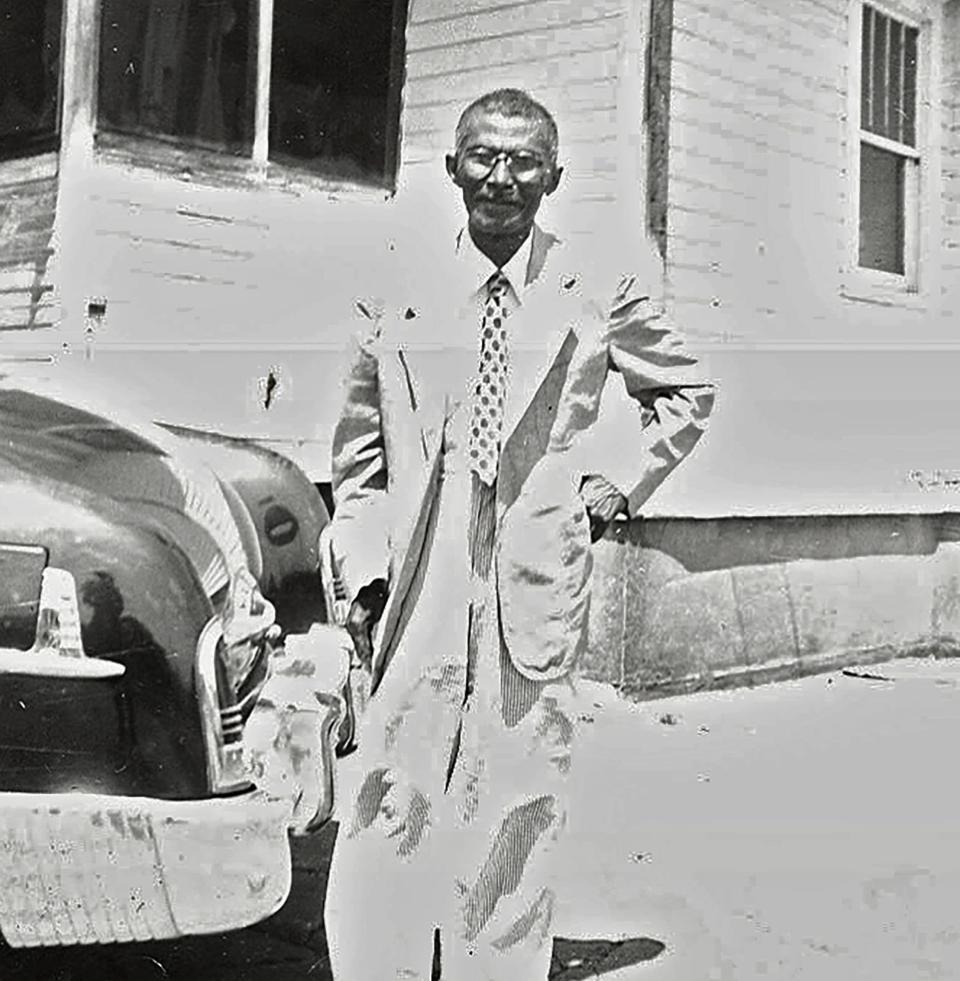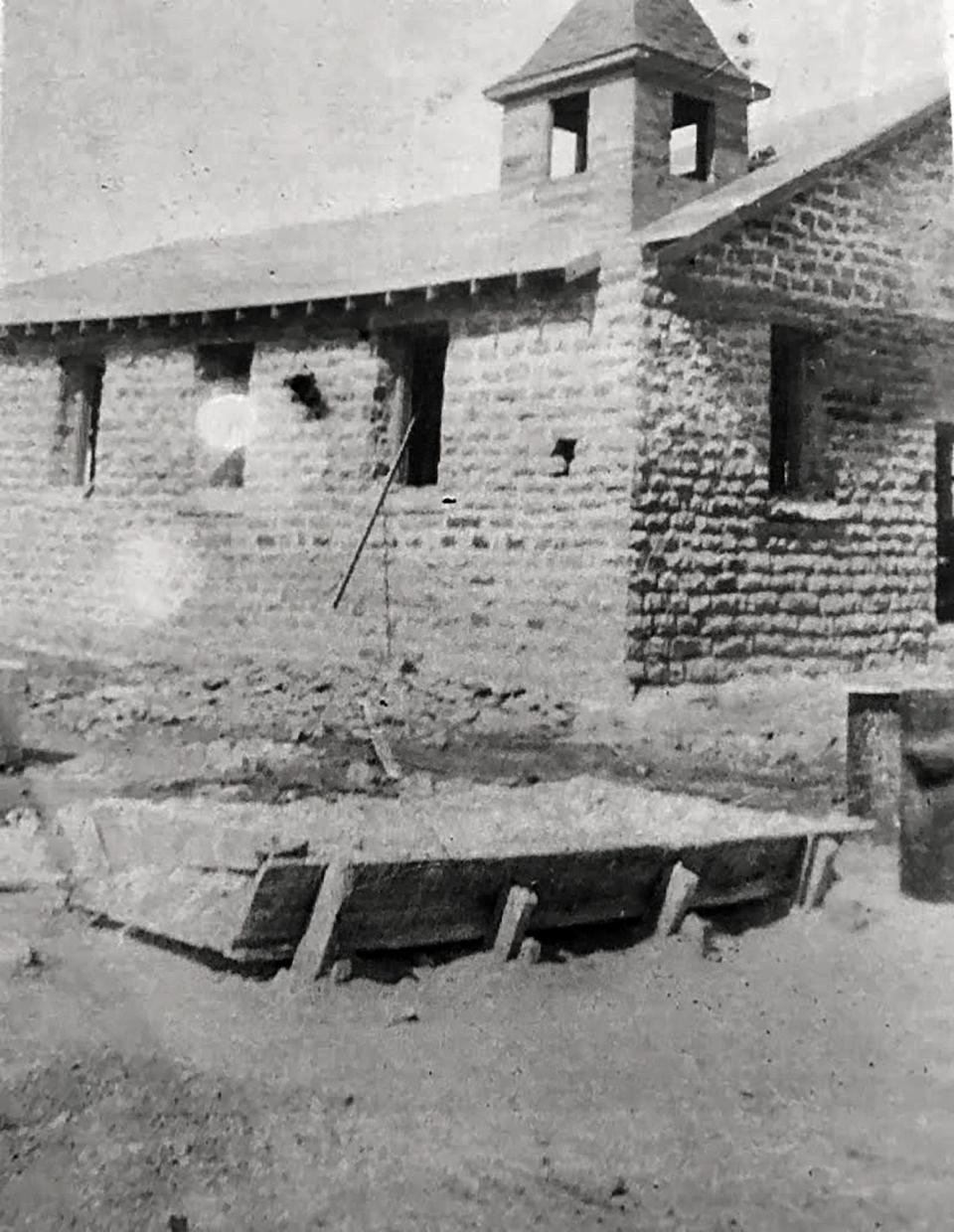'This is God's house': Church restoration efforts are underway in historic all-Black town
- Oops!Something went wrong.Please try again later.
SUMMIT — Brought together by faith and friendship, two men hope to gift a congregation with the restoration of their historic church building in one of Oklahoma's historic all-Black towns.
Scott Reno, of the Fort Gibson Lake area, and the Rev. Earl Baker Jr., of Wagoner, are restoring the St. Thomas Primitive Baptist Church building in Summit. The friends hope to complete the $50,000 project in time for the house of worship's centennial this year — but they need help.
The church building was placed on the National Register of Historic Places in 2004 because of its significance to the historic all-Black town and the social importance of the all-Black communities in Oklahoma's history. The structure was built in 1923 by a prominent Black businessman and minister from Texas named Lee Wilder Thomas, the founder of Summit. Also known as the Rev. L.W. Thomas, he envisioned Summit, about six miles southwest of Muskogee, as a place for Black individuals and families to settle and prosper.
Lynda Ozan, deputy state historic preservation officer, said Thomas platted the entire town — "he was kind of well ahead of the city planning movement" — dedicating specific parcels of land for specific uses. She said he intentionally placed the church in a central location where everyone in the town could see it and get to it from an equal distance.
Baker, 64, the church's pastor since 1996, was baptized in the church, and it has long held a prominent place in his heart. He met Reno, a semi-retired PGA teaching professional, several years ago and what was a business relationship developed into a friendship. Their bond has now become the solid foundation for the church restoration project.
"This is God's house," Baker said. "I believe the anointing has been on the church for many, many years."
The minister said he had to lean into those positive thoughts about four years ago. That was when the church building fell into disrepair in a pretty dramatic way.
A person was walking down the church's center aisle when the floor underneath it collapsed during a worship service one Sunday.
Determined effort
Baker said the church's foundation problems began after earthquakes occurred nearby in 2015 and 2016. He said he met Reno before the building became a safety hazard, and he's glad he did. With partial collapse of the sanctuary floor, the building became too unsafe for Baker's congregation to meet in the building, and they began gathering in a small adjacent structure that serves as the church's kitchen and fellowship hall.
The two friends began to plan out restoration efforts and initially hoped to tear out only the front portion of the church and redo the floor.
At that point, the project experienced some major setbacks. Baker said between 2017 and 2020, he experienced three strokes and a heart attack. The renovation project stalled for about two years, largely due to Baker's health issues and the COVID pandemic. Both Reno and Baker contracted COVID, but Baker became seriously ill with the virus. He said he also suffered another stroke after surgery to rid his body of cancer earlier in 2022.
Baker said his congregation included about 75 people pre-COVID, who made their way to the historic church from cities like Tulsa, Oklahoma City and Broken Arrow. The congregation now includes about 40 people who meet for online services. Baker said he preaches to his virtual congregation, "but there's something about being in the Lord's house worshipping together."
"I know for sure that the spirit of God is in this place," Baker said. "I think about Nehemiah who wanted to build the wall. People talked about him, but he wanted to build the wall."
Meanwhile, about a year ago, Reno, 66, assumed the role of project coordinator. He said a GoFundMe was started to raise about $50,000 when the restoration effort changed directions. Everyone involved in the project felt it was time to do some major work on the building. They were thankful that the building's original exterior of sandstone was in good shape, but the partially collapsed floor, deteriorating ceiling and other disrepair needed to be addressed. Church volunteers took the pews and other items out of the building and placed them in a storage container on the house of worship's property.
Reno said he and his wife, Ginger, who attend First Baptist Church of Tulsa, really wanted to help his friend and his congregation worship in their building once again.
"I felt led by God to be a part of this, and there's something about small country churches that I just love," Reno said.
Reno said even though the fundraising goal hasn't been met, restoration work began about six weeks ago. The building's stem wall has been repaired, and a tarp has been placed over the roof to protect what is left in the sanctuary, among other things. Efforts also have been made to prevent the deterioration of a new floor, once it is installed.
"Even though our building fund is still extremely small, Pastor Baker and I agree that God is asking us to use what funds he has provided so far and not let that money sit idle while waiting on additional donations," Reno said. "Beyond that, we are waiting on God's provision to move forward."
There is a need now for manpower, money and materials to basically repair, revamp and revitalize the sanctuary and modernize the building, he said. With additional funding, the plans for the church renovation include: installation of a new, safe, solid, concrete floor structure; replacement of the ceiling; insulation of interior walls; bathroom updates; refinishing existing pews; roof repairs; installation of accessibility ramps and sidewalks; plus some minor landscaping.
Family history, town history
Schuyler Carter, of Nashville, Tennessee, is just as excited as Reno and Baker to see the church restoration plans come to fruition.
As the great-granddaughter of Lee Wilder Thomas, Carter said she grew up in Summit and remembers attending the church for worship services, vacation Bible school, Christmas season solos and other activities over the years. She said she successfully worked to get her great-grandfather's house in Summit (located about half a mile from the church) on the National Register of Historic Places in 2018.
"I am grateful that we still have people who are interested in preserving this legacy," she said. "As a descendant, I'm always a lover of history and preservation ... so knowing that folks that I grew up with and grew up around, that they are taking as much interest in seeing the legacy continue, I'm grateful for it."

She said Lee Wilder Thomas was among Black men who struck oil in Texas after the Mexia oil field was discovered in 1920 in Limestone County, Texas. They began to enjoy the prosperity of the Mexia oil boom but encountered racism. Lee Wilder Thomas, along with many other Black businessmen, farmers and entrepreneurs, saw Oklahoma as a place they might create communities where Black people could live and work together in relative peace without the discrimination and bigotry that was occurring elsewhere.
"He had a good amount of money at that time and so the story goes that folks in Limestone County (Texas), the white folks, didn't like these Black boys driving around and having all this money and were targeting them," Carter said. "That is the story as to how he ended up migrating, I guess I would say forcefully migrating, to Oklahoma."
Carter said her great-grandfather apparently nurtured that dream even though the Tulsa Race Massacre of 1921 served as evidence that Black men and women faced danger based on bigotry and discrimination in Oklahoma.
The minister and businessman's dream for a better future in Oklahoma was shared by other Black individuals who, like him, founded numerous communities that eventually came to be known as Oklahoma's historic all-Black towns. Larry O'Dell, with the Oklahoma Historical Society, said the all-Black towns of Oklahoma represent a unique chapter in American history because nowhere else did so many Black men and women come together to create, occupy and govern their own communities. O'Dell said Black individuals created more than 50 identifiable towns and settlements in Oklahoma. Summit is one of 13 historic all-Black towns that still remain.
In a sense, her great-grandfather's love for the land and community trickled down to Carter, a special collections library assistant at Fisk University. She earned a bachelor's degree in agriculture business, a master's degree in urban planning and a Ph.D. in urban regional science with a focus on historic preservation, museum curation and digital media. She said she understands how much of her family's history is intertwined with Summit history, starting with because of her great-grandfather's vision for the area. She said her grandfather, the late Joe E. Thomas, was one of Lee Wilder Thomas' children who stayed in the area, worked the land and lived in the family home. His late wife, Carter's grandmother Erma Thomas, was a longtime educator who spearheaded the initiative to officially incorporate the town of Summit and served as its first (and longtime) mayor beginning in 1980.
Carter recalled hearing older people talk about the cotton gin and the grocery store that were once important sites in Summit. A beloved school, the W.E.B. DuBois School, was listed on the National Register of Historic Places, but it burned down in 1991. Carter said she recently looked at a picture of St. Thomas Primitive Baptist that was taken when it was under construction, and she was reminded again how significant the church building has been, not just to her family history but the community's history.

"I think back and I'm like, man, my grandfather touched these rocks — this is local stone — my grandfather was there," she said.
"My great-grandfather's story is something that I hold dear [not] just because he is my blood, but [also because of] his ambition and, also his love for his people and the community around him. He didn't want just his family to succeed, he wanted to see the community succeed as a whole."
Looking forward
Reno told Baker he's convinced the Lord wants him around to see his beloved church restored.
"I keep telling him God wants him there when the church gets finished," Reno said, grinning at his friend.
Ozan, with the state's Historic Preservation Office, said she's pleased the two friends are trying to restore the old historic church because it has always been important to Summit.
"This building was really the foundation for the community, and it's that one thing that everybody could identify with, even when schools weren't being built yet, or schools were shut down and they had to start going to school in Muskogee — they still had their own church," she said.
"I think that's one of the key things — when everything else goes away, the church stays in these small communities."
For his part, Baker is not about to give up on the idea of seeing his beloved church restored. He and his congregation, friends and family, including wife Barbara, are not giving up on his full recovery, either.
"A lot of people say why don't you go on and quit, but God has never quit on me," he said. "I believe God is going to do a miracle, and we're going to give him the praise. God always has a ram in the bush."
How to help
For more information about the church restoration project in Summit, to make a donation or to volunteer, go to the Save Historic St. Thomas Primitive Baptist Church GoFundMe page. To contact Scott Reno, the project's coordinator, email golfdoc@rocketmail.com.
This article originally appeared on Oklahoman: Church building is being restored in historic all-Black town of Summit

